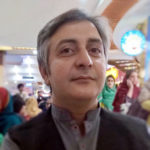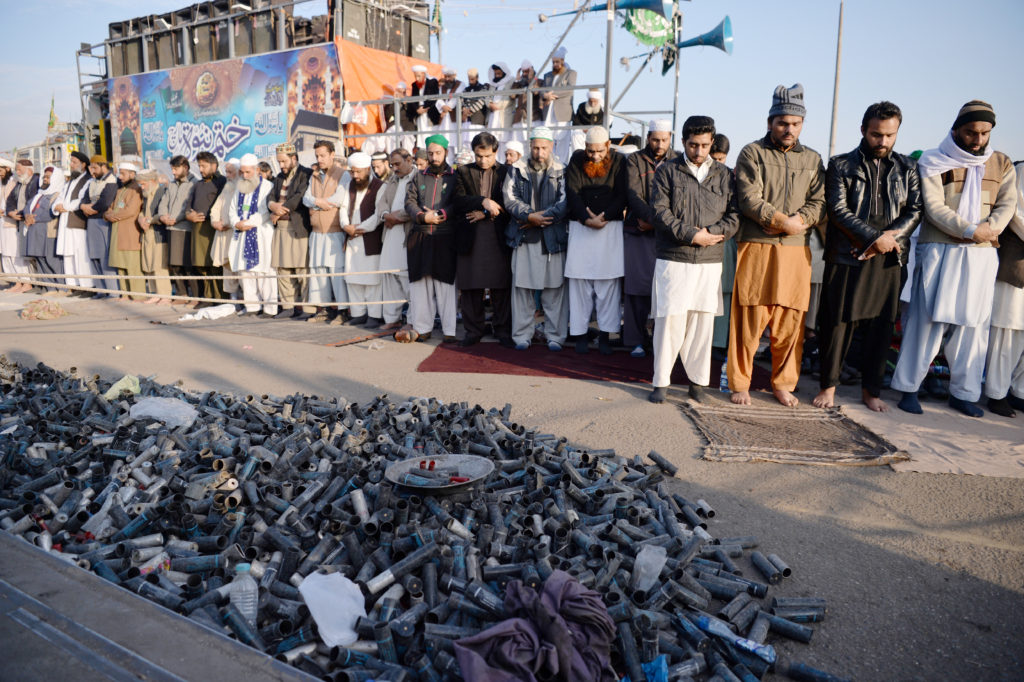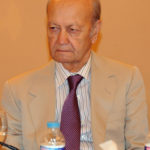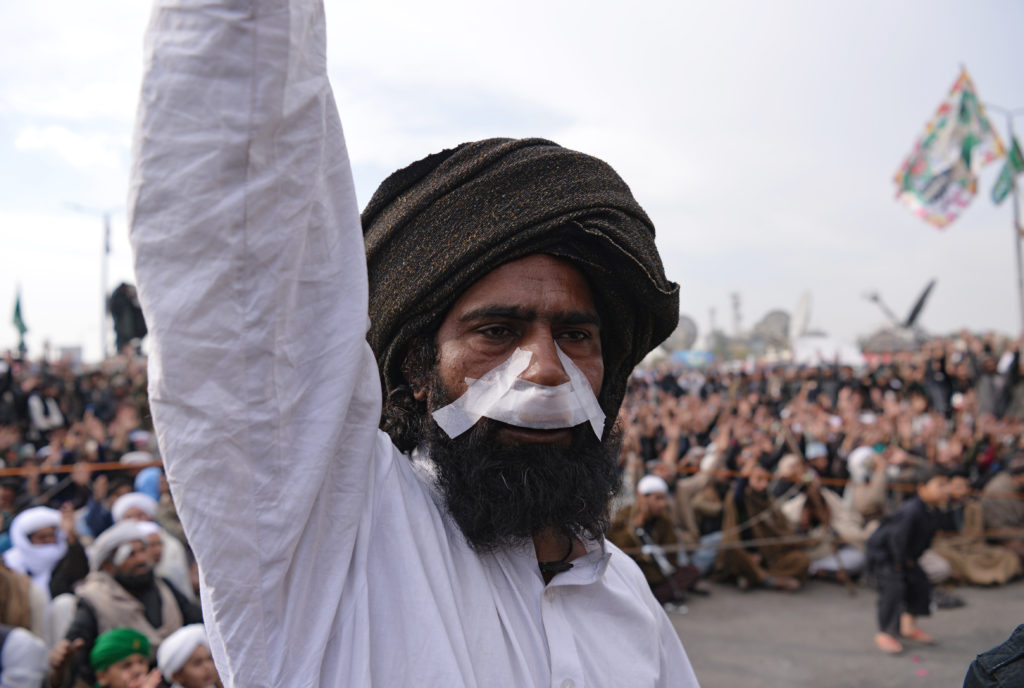Should extremist elements in Pakistan be mainstreamed and allowed to contest elections?
By Newsline Admin | Newsbeat National | Published 6 years ago
Farrukh Khan Pitafi is a television journalist based in Islamabad.
 Mainstreaming extremists is a misnomer. The better term is reintegration. Mainstreaming essentially implies that the extremist groups be brought into the mainstream without any effort to deconstruct or dismantle the ideology they represent. Recent attempts by a few proscribed organisations to politically launch themselves, validate this interpretation.
Mainstreaming extremists is a misnomer. The better term is reintegration. Mainstreaming essentially implies that the extremist groups be brought into the mainstream without any effort to deconstruct or dismantle the ideology they represent. Recent attempts by a few proscribed organisations to politically launch themselves, validate this interpretation.
The problem with this approach is that it makes an already bad situation worse. Despite battling terrorist organisations for a decade-and-a-half, we have not seen any serious attempt to come up with a counter-terror, or a counter-extremist narrative. Consequently, the ideology responsible for the radicalisation of these elements remains firmly intact. Giving these groups more power will most definitely have a disastrous impact.
It is important to comprehend the reasons behind our collective failure to come up with a national narrative against terrorism. We know that the country’s religious elite is either unwilling, or uninformed regarding its critical role in making such a narrative possible. Another reason is our state’s very own nature. The Islamic Republic of Pakistan has, so far, found it impossible to disengage from certain political interpretations of Islam, which are clearly being used by the extremists to bring down society as a whole. This economy of demand and supply, hence, remains largely unaffected. And then there is the presence of enough disaffected elements in society, ready to be recruited by extremist networks in a heartbeat. Any notion of further empowering such militant groups by giving them political power is suicidal, at best.
Our toughest challenge lies with the militant groups targeting India. Many of these groups never directly attacked citizens of Pakistan. However, they are banned because they were found guilty of exporting terror by world bodies like the United Nations Security Council (UNSC). While there may not be enough impetus in society to isolate groups like the Jamaat-ud-Daawa, allowing them to exist in any shape, let alone in a position of political strength, guarantees international isolation, making the Indian state’s self-proclaimed goal easy to achieve. And since our confrontation with India continues unabated, it is currently impossible to sanitise their foundational philosophy. The country simply cannot afford to allow these groups into the political mainstream where there is already no dearth of a confused and religiously-charged narrative.
One area where re-integration really makes sense is that of the captured combatant ‘foot soldiers.’ These men, and in a few exceptional cases, women, were young when they were radicalised. Since then, they have been caught and put through rigorous deradicalisation programmes and are ready to be part of mainstream society. The state may not be able to detain them indefinitely, owing to policy shifts and legal debates. Therefore, their inevitable release should be done with a degree of planning and preparation, so as to enable their effective reintegration into society and prevent further radicalisation. However, it is imperative to remember that only insignificant foot soldiers and less-influential combatants, who enjoy a degree of anonymity, can be allowed back into society. If you bring known faces with symbolic value — like leaders of the pack — back into society, the result might be mass panic.
I do not support the mainstreaming of extremist groups, but I am not averse to the concept of second-chances for misguided souls.
Zarrar Khuhro is an executive producer of Dawn News TV.
 Should and would build no bridges, they say. And even if they did, a great deal of water has passed under those proverbial bridges since the asking of this question. These groups have already been mainstreamed and are already contesting elections. They are, in fact, successfully defying the state with near-complete impunity, as evidenced by the Faizabad fiasco and its metastasisation.
Should and would build no bridges, they say. And even if they did, a great deal of water has passed under those proverbial bridges since the asking of this question. These groups have already been mainstreamed and are already contesting elections. They are, in fact, successfully defying the state with near-complete impunity, as evidenced by the Faizabad fiasco and its metastasisation.
Prior to this, the argument in favour of ‘mainstreaming’ (a clunky term if there ever was one), was that by including these groups in the political process, they would in time become more moderate and amenable to what passes for political norms in this country. This may have looked good on a particularly optimistic paper, but in actual fact, the opposite was more likely: that these groups would successfully radicalise the mainstream — after all, it is a truism that when the extreme right gains, the entire political centre moves right. In Pakistan, where there is no real ‘left’ to provide a counterweight to such a tilt, the balance was inevitably going to shift and teeter.
That is what has happened, and no one should feign surprise. The new right, as exemplified by parties like the Tehreek-e-Labaik (TLP) and the Milli Muslim League (MML), has had the effect of making the old right (comprising the JI and such parties) look tame by comparison. The gains made by these fledgling parties in the recent elections are simply a preview of what is to come.

Even between these two parties, there are great variations. Given the antecedents of the MML, one can surmise that its mainstreaming is some kind of a quasi-state project but with TLP it’s a lot murkier. Are they being mainstreamed or are they mainstreaming themselves? And which is the more frightening prospect? Indeed, even the MML seems to look askance at the sharp and sudden rise to prominence of the TLP. In private conversations, they state their case thus: only we can keep the wolf from the door, only we have the bonafides to bring the adherents of these groups to their senses. And there is an implicit warning as well: ‘If we are not to participate in the political process, what are we to do with our cadres? Who will they join then?’
But even such questions seem distant and rhetorical in the face of the madness that has been unleashed, that has been allowed to flourish by the action and inaction of all the varied, feuding pillars of our self-destructive state. Yet here we are, sheltering in the oasis of the imagined, while in actual fact our bleached bones already lie exposed in the desert of the real.
Zoha Waseem is a PhD candidate at King’s College London, researching urban policing and counter-terrorism in Pakistan.
 Over the last few years, there has been a gradual acceptance within certain academic and policy circles worldwide that extremism and its violent counterpart terrorism cannot be defeated militarily. Militaristic counterterrorism strategies and tactics have arguably done little to curb the threat of terrorism and violent extremism, if not exacerbated the existing state of affairs. One of the alternative approaches to militarised counterterrorism policies has been the reintegration of extremist groups and individuals in the political and social folds. There are several implications of mainstreaming extremist elements and allowing them to contest elections in fragile democracies like Pakistan.
Over the last few years, there has been a gradual acceptance within certain academic and policy circles worldwide that extremism and its violent counterpart terrorism cannot be defeated militarily. Militaristic counterterrorism strategies and tactics have arguably done little to curb the threat of terrorism and violent extremism, if not exacerbated the existing state of affairs. One of the alternative approaches to militarised counterterrorism policies has been the reintegration of extremist groups and individuals in the political and social folds. There are several implications of mainstreaming extremist elements and allowing them to contest elections in fragile democracies like Pakistan.
Let’s consider first the political implications. With mainstream political parties like the PML-N, PPP and MQM already in insecure positions due to ‘political engineering’ in Pakistan, radical right-wing parties rooted in extremism and with largely conservative vote-banks may influence how political alliances are formed in the future. This can affect the long-term ideological leanings of otherwise secular, liberal or even right-of-centre political parties. In the worst case scenario, such alliances can, over time, result in extremist influences further penetrating the political landscape of Pakistan.
Closely linked to the above are the social implications. The mainstreaming of extremist organisations gives these groups a greater level of legitimacy. In other words, their inclusion into politics legitimises their cause(s). Given the sectarian and sub-sectarian inclinations of some of these groups, the legitimation of extremist groups, and by extension their ideologies, is likely to create further fissures and divisions within the social fabric of Pakistan.
Third, these political and social implications can have dire consequences for human security in Pakistan, particularly compromising the positions of already vulnerable groups and minorities, such as women and Ahmadis. Official policies and legislative decisions concerning the security of these groups (for example, blasphemy laws) are more likely to be influenced by the opinions of extremist voices present in social and political circles.
Then, there are overall security implications. Mainstreaming extremism legitimises a cycle of hate. Religious extremism ideologically endorses violence, which leads to the radicalisation of individuals who put these ideas into actions, often resulting in acts of terrorism. These acts can fuel extremist causes that demand more political and social space. Religious extremism provides an environment that is conducive to violence, and groups belonging to schools of thought that promote, endorse, or tolerate violence are, dare I say, increasing the likelihood of violent extremism in Pakistan.
The Pakistani state should be creating space for non-violent ideologies and unless groups and individuals do not overtly denounce violence (and stick to this stance on every platform) they should not be allowed into the mainstream. Should a group be noted to shift their stance from non-violent to violent approaches, active efforts must be undertaken to remove them from the mainstream. Democracy should allow for differences of opinion, but it does not need to encourage ideas that can further the participation in violence or hate.
Talat Masood is a retired lieutenant general of the Pakistan Army and a former federal secretary.
 It is never an easy choice for any government to decide whether extremist elements be mainstreamed and allowed to contest elections. There are historical precedents in many countries where different approaches have been followed.
It is never an easy choice for any government to decide whether extremist elements be mainstreamed and allowed to contest elections. There are historical precedents in many countries where different approaches have been followed.
The classic case in support of mainstreaming is the largely successful integration of the Sinn Fein party, the political wing of the Provisional Irish Republican Army, in Ireland.
The quest to integrate the Taliban in the Afghan power structure is another example that has yet to be tested. However, it would be unwise to mainstream extremist parties without demanding of them a specific undertaking: that they give up arms. And only those of them should be mainstreamed who categorically abandon militancy and are genuinely seeking to be a part of the political process. Determining their true intentions will remain a major challenge.
They could advance their militant agenda by being partners in a coalition government and promote extremism in parliament and use their clout to infiltrate state institutions. And the way our governments function, it is unlikely their activities would be monitored closely.
The other worrisome aspect is that, for expedient reasons, political parties may co-opt extremist parties. A classic example is the Pakistan Tehreek-e-Insaaf (PTI), which has entered into an electoral alliance with Maulana Samiul-Haq’s Jamiat Ulema-e Islam (JUI-S) who also heads the Difa-e-Pakistan Council (DPC), a conglomerate of religious and sectarian organisations. This is a worrying sign of the extent to which political parties are prepared to compromise on fundamentals.

What motive did Hafiz Saeed have in mind when he formed his political party? Is it merely another means by which he intends to pursue his aggressive Kashmir policy? Or is it that domestic politics now precedes regional pursuits? Is it American pressure that is pushing Pakistan’s establishment to curb the activities of organisations such as LeT and JuD? It is likely that the establishment is of the view that the mainstreaming of Jamaat-ud-Daawa (JuD) would help channelise its energies more productively.
The question is whether the entry of extremist elements in politics will weaken or strengthen the political system and institutions. Much would depend on what their true intentions are, what role they would be playing in the National Assembly and the message they intend to deliver to the masses. Are they joining the political process of their own accord, or are they being brought in to cut into the (PML-N) vote bank? If the latter is the case, then their entry could have adverse consequences.
Pakistan’s already tainted international image will receive a fresh blow if militant organisations are mainstreamed. The fact that the head of the JuD was involved in the Mumbai attacks further complicates the party’s entry into electoral politics.
At the end of the day, how these radical parties will fare in the next general elections is a critical issue. It is one thing for a party to do well in one constituency, but fighting national elections is a different ball-game.
Shaukat Qadir is a retired brigadier and a former president of Islamabad Policy Research Institute.
 Until some months ago, I would have said, “Certainly not in Pakistan.” Unlike those who would have or would today vote in favour of the motion, I am quite convinced that our extremists merely seek to grasp at political power before they show their true, ugly hue. So, why the uncertainty?
Until some months ago, I would have said, “Certainly not in Pakistan.” Unlike those who would have or would today vote in favour of the motion, I am quite convinced that our extremists merely seek to grasp at political power before they show their true, ugly hue. So, why the uncertainty?
Let me try to explain. There are organisations like the IRA (Irish Republican Army) and Sinn Fein that were fighting to liberate Ireland and their stated policy was, that this could “not be achieved without violence.” By all standards, they too were terrorists and extremists. Yet, today, among them, even he who had a huge bounty on his head, sits across the table from the British Prime Minister to negotiate Ireland’s future.
Until a few months ago, the essential difference between our extremists and the IRA was that the latter represented the aspirations of a considerable portion of the Irish people and would have won a sizeable portion of seats in any election. Our extremists, on the other hand, were not representative. However, in the recent by-elections in Lahore, the Tehreek Labbaik Ya Rasool Allah (TLY), a radical Islamist party, gained significant ground.
I apprehend, like many others, that once given the opportunity, the lure of religion might help the extremist elements grow. On the other hand, we have had religious political parties which have existed since before Partition and supported extremism, even until recently. But these have not grown since.
The bottom line is that those in question showed a respectable vote bank in the NA-120 by-poll. But this showing is for just one seat in one province. Its supporters in the province and country, might be totally negligible or far greater in number. Our problem is that a handful of people can get together one evening, decide upon office-bearers among themselves and, if they can afford the fees, begin the registration process as a political party the following morning.
There are no considerations of what showing they must have in future elections either. If a party fails to win a single seat, consistently, it is still entitled to contest the elections, so long as it can field a candidate. The consequences are rather farcical.
However, in the case of extremists aspiring to political representation, a process to that end may have to begin. The parliament must pass a bill specifying the percentage of the vote-bank these aspirants represent, in order to be able to register as a political party. And this must be determined through a referendum.
It must be kept in mind that a group-specific law can be almost as bad as an individual-specific one — like that which permitted Nawaz Sharif to lead his party, despite being a criminal. Consequently, the law should read, “Since the aspirants to this political party consists of X per cent of individuals who used, or advocated use of force against the state, they should only be allowed to register their party if they possess Y per cent of the national vote-bank in a referendum.”
Following this, a referendum should decide the fate of their political future.


